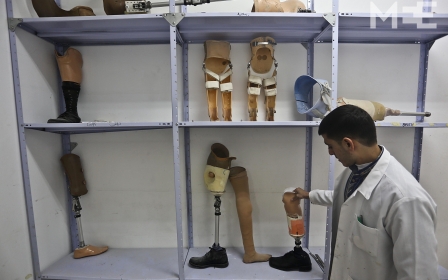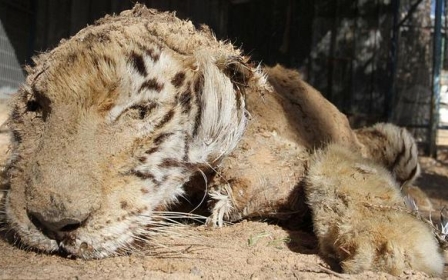Gaza amputee: 'I was a footballer before the war'
Just as the sun was setting over the Mediterranean sea on the evening of 11 July 2014, an Israeli drone strike shattered the temporary silence that had descended on the small coastal Gazan strip. The explosion, part of a barrage of explosions that had been taking place off and on over the previous four days as part of Israel's so-called "Operation Protective Edge", rocked al-Narzal street in Gaza City.
It was just minutes before the evening call to prayer for Maghrib and one of Gaza’s most celebrated and promising footballers, Mohammed Abu-Byd, was standing on al-Narzal Street when the bomb dropped. It was Ramadan, the Muslim Holy month of fasting, and Mohammed was lingering outside his father’s home with a group of his friends while they waited for Iftar, the evening meal that would break the day’s fast.
The details are fuzzy. Mohammed remembers little of the events that followed. In the confusion and chaos that followed the strike, he remembers his shock when he realised that bits of metal and brick had torn into his left leg. He estimates he was conscious for about a minute before blacking out just outside his father’s home on the corner of Al-Narzal street. He regained consciousness later that evening in a crowded ward at Al-Shifa hospital only to learn that he was the lone survivor among his friends.
“We were just standing in the street, waiting for the call to prayer and they started shelling the whole street. Shrapnel tore into my leg. I was awake for about a minute, then passed out from the pain. When I woke in up Al-Shifa hospital later that night I was told that my friends had become martyrs.”
Now, he will never play football again. “They’ve stolen my dream,” says Mohammed.
Even after “extensive inquiries,” the Israeli army could not corroborate details of “the alleged strike,” that injured Mohammed, ending his promising career. Nor could they confirm who - or what - the target for the drone attack was. “The IDF made extraordinary and unprecedented efforts throughout Operation Protective Edge to avoid civilian casualties,” an Israeli army spokesperson told MEE of the summer in which around 2,200 Palestinians were killed and approximately seventy Israelis - of whom 66 were soldiers - were also killed.
Mohammed spent the ten days following the air-strike recovering in al-Shifa hospital in Gaza before being transferred to a medical facility in al-Arish in Egypt, some 50 kilometers south of the Rafah border crossing. Mohammed’s stay in Al-Arish was then prolonged after the Egyptian authorities closed the border, preventing him from returning home. When he was finally able to go back to his family he spent the remainder of the war in al-Shifa hospital until a lasting cease-fire was agreed.
Mohammed's leg could not be saved and while he received emergency treatment and rehabilitative physiotherapy in al-Shifa, the war continued. Only five days after Muhammad lost his leg - on Wednesday, 16 July - four young boys were killed playing soccer on a beach in Gaza City. Palestinian coach and local footballing legend, Ahed Zaqqut was also killed by an airstrike while he slept in his home just weeks after. By the time a lasting cease-fire could be brokered, more than two thousand had Palestinians had lost their lives.
Since being discharged from al-Shifa hospital, Muhammad has committed himself to his rehabilitation. He spends three mornings each week undergoing physiotherapy at the Artificial Limbs and Polio Center and three mornings at the Jazeera gym in Gaza City. Every week he also receives some treatment in his grandfather’s home thanks to Waleed Albatach of the Palestinian Medical Relief Society and is pursuing a regime of medication, including painkillers.
“My life has only changed in one way. Before, I was a footballer. Now all that is gone. I spend most of my time in the house since the injury. The only thing I hope is that I will be able to leave the country, finish therapy, get a new leg and organise my life. Now my entire life depends on leaving Gaza.”
Shortly after the war ended, the Palestinian Ministry of Health reportedly promised Muhammad he would receive specialised medical attention abroad. Fateh Abu Wardeh, an official responsible for arranging treatment outside Gaza, told him he would go to Venezuela. “It doesn’t matter if I go to Venezuela or any other country, what matters is that I receive treatment.” But more than six months after being injured, Mohammed - like many in Gaza hoping to rebuild their lives - is “still waiting.”
“Before, my whole life was football, now everything has changed.”
Stay informed with MEE's newsletters
Sign up to get the latest alerts, insights and analysis, starting with Turkey Unpacked
Middle East Eye delivers independent and unrivalled coverage and analysis of the Middle East, North Africa and beyond. To learn more about republishing this content and the associated fees, please fill out this form. More about MEE can be found here.






